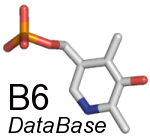|
|
| type |
Journal Article |
| authors |
Kelly WL, Pan L, Li C. |
| title |
Thiostrepton biosynthesis: prototype for a new family of bacteriocins |
| journal |
J Am Chem Soc |
| Activity |
tsra |
| Family |
tsra |
| sel |
selected |
| ui |
19265401 |
| year |
(2009) |
| volume |
131 |
| number |
12 |
| pages |
4327-34 |
| | |
|---|
| keywords |
doi: 10.1021/ja807890a |
| abstract |
Thiopeptide antibiotics are a group of highly modified peptide metabolites. The defining scaffold for the thiopeptides is a macrocycle containing a dehydropiperidine or pyridine ring, dehydrated amino acids, and multiple thiazole or oxazole rings. Some members of the thiopeptides, such as thiostrepton, also contain either a quinaldic acid or indolic acid substituent derived from tryptophan. Although the amino acid precursors of these metabolites are well-established, the biogenesis of these complex peptides has remained elusive. Whole-genome scanning of Streptomyces laurentii permitted identification of a thiostrepton prepeptide, TsrA, and involvement of TsrA in thiostrepton biosynthesis was confirmed by mutagenesis. A gene cluster responsible for thiostrepton biosynthesis is reported, and the encoded gene products are discussed. The disruption of a gene encoding an amidotransferase, tsrT, led to the loss of thiostrepton production and the detection of a new metabolite, contributing further support to the identification of the tsr cluster. The tsr locus also appears to possess the gene products needed to convert tryptophan to the quinaldic acid moiety, and an aminotransferase was found to catalyze an early step in this pathway. This work establishes that the thiopeptides are a type of bacteriocin, a family of genetically encoded antimicrobial peptides, and are subjected to extensive posttranslational modification during maturation of the prepeptide. |
| last changed |
2017/09/04 13:53 |
|











